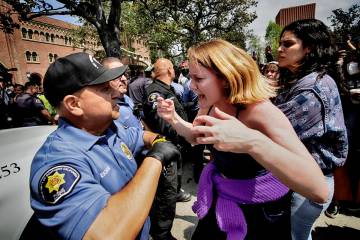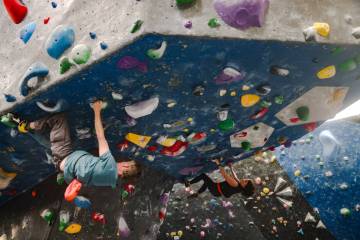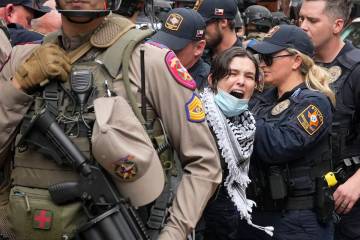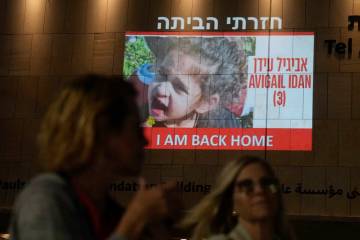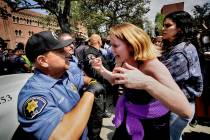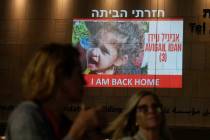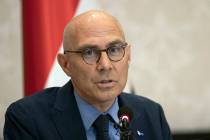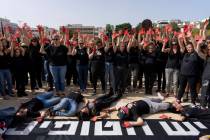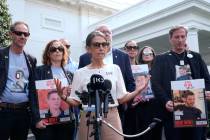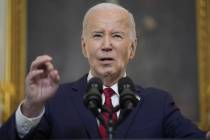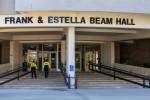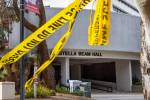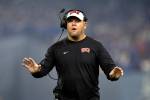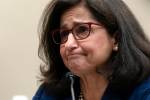College tuition likely to rise, but how much?
Tuition at Nevada's colleges and universities will probably go up next year. There's wide agreement on that.
But will it rise 8 percent? Ten percent? Twenty five percent?
Could it possibly go up 225 percent?
"Oh no," said Jim Rogers, the higher education system's chancellor. "We wouldn't have any students left."
Rogers and his cohorts in higher education leadership have been talking up that 225 percent increase for more than a week now.
That's what it would take, they say, to make up for the $473 million in cuts to the system over the next two years that Gov. Jim Gibbons has proposed.
There appears to be truth in the number, even if it's only a theoretical truth. According to figures from the system's annual budget, a 225 percent tuition increase would raise about $475 million over two years.
Gibbons has said he focused so many of the overall cuts on higher education -- about 75 percent of all the cuts in state government -- partly because it is the only state government entity capable of raising its own money at will.
Higher education system projections say UNLV's tuition for in-state students would have to nearly double to make up for the cuts (officials haven't done projections for out-of-state students). The College of Southern Nevada's tuition would more than double.
UNLV would then cost more for in-state residents than the University of California, Berkeley would for California residents.
Rogers acknowledged that some of the gap in the state budget will have to be covered by higher student fees. But there is a limit, he said.
Once you raise fees too much -- and the consensus seems to be more than 10 percent would be too much -- you begin to lose money.
If it costs too much, many students will go elsewhere or won't go to college at all, Rogers and other system officials. So, even though the system would be getting more money per student, its overall intake would go down because enrollments would go down.
A 10 percent increase would raise somewhere between $10 million and $15 million a year, depending on how it affected enrollment.
So, what about the rest of the $473 million cut?
Well, most everyone involved seems to think that will never happen.
Assembly Speaker Barbara Buckley, D-Las Vegas, didn't exactly call Gibbons' budget dead on arrival, but she did say it wasn't much more than a starting point.
"There is no way that UNR and UNLV can be cut by approximately 50 percent," she said. "If we are to consider those cuts, we might as well shut down the institutions."
Rogers insists that the system cannot withstand any cuts at all. It is traditionally underfunded, he said, getting only about 85 percent of what its peer systems get.
That was before cuts of the last two years in the area of 10 percent. But some legislators, despite touting their support for education, see no cuts as an unrealistic goal.
"If we can essentially keep the cuts where they are, 8 percent to 10 percent, I think we can sell the idea to the universities that they're lucky," said state Sen. Bob Coffin, D-Las Vegas.
Coffin, whose wife is a UNLV professor, said the system's leaders should rethink their missions. It seems like a waste of money, he said, for the community colleges to offer four-year degrees when that's what Nevada State College and UNLV are there for.
And he said it doesn't seem like the best time for UNLV to be going gangbusters in trying to become a major research university. That's an expensive proposition, he said, that should be done over decades, not in just a few years.
Nassar Daneshvary, UNLV's faculty senate president, said the university is already likely to lose some faculty because of the cuts. And not just the cuts to the operating budget. Faculty face a possible 6 percent pay cut, as well as increases in the cost of benefits.
"I don't know how to describe it," he said of the overall feeling. "Anxiety. Betrayal.
"People are looking," he said. "Dusting off their resumes."
He said he and others are trying to remain optimistic, putting their hopes on a Legislature that keeps promising solutions, even though Buckley and her Democratic colleagues -- who are firmly in control of the Legislature -- said Thursday that it could take nearly three months for them to actually come up with any.
"I am hopeful," Daneshvary said, "that the cuts won't be more than 10 or 15 percent."
Beyond that, he said, permanent damage would be done to the system. Not only would the best of the faculty leave, but the university would get a reputation nationally that would make it nearly impossible to recruit quality professors.
He laughed that the governor would so forcefully oppose tax increases while at the same time putting the burden of cuts to the higher education system on its workers and students.
"Only students and faculty pay a tax," he said. "Nobody else."
Contact reporter Richard Lake at rlake@reviewjournal.com or 702-383-0307.




